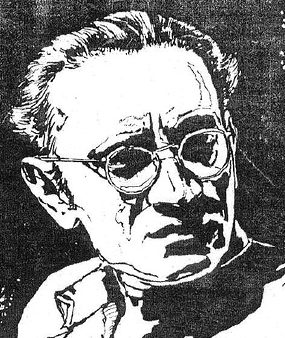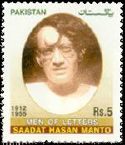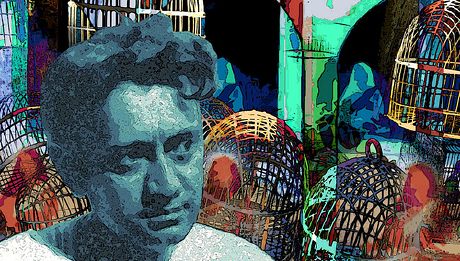 (Editor’s Note: Today, January 18this the death anniversary of Saadat Hasan Manto. Two day’s ago (January 16) was the anniversary of the ‘judgement day’ in his famous ‘obscenity trial.’ To mark these anniversaries, we are re-posting this, the last of a three part series on ‘Manto ka Muqaddama,’ by Aziz Akhmad (first two parts here and here). Manto’s literary genius is always relevant, but the story of this trial is all the more relevant in these times when questions of morality, of speech and of laws are so prominent once again. We also encourage the reader to re-read this tribute to Manto, our other posts on him, and of course Manto’s own works in his own words!)
(Editor’s Note: Today, January 18this the death anniversary of Saadat Hasan Manto. Two day’s ago (January 16) was the anniversary of the ‘judgement day’ in his famous ‘obscenity trial.’ To mark these anniversaries, we are re-posting this, the last of a three part series on ‘Manto ka Muqaddama,’ by Aziz Akhmad (first two parts here and here). Manto’s literary genius is always relevant, but the story of this trial is all the more relevant in these times when questions of morality, of speech and of laws are so prominent once again. We also encourage the reader to re-read this tribute to Manto, our other posts on him, and of course Manto’s own works in his own words!)
Saadat Hasan Manto walked out of the courtroom of Sessions judge Inayatullah Khan a free man (here and here). The story Thanda Gosht was declared not obscene, and Manto’s conviction by the lower court was quashed – his sentence declared void and his fine, which Manto had already paid, ordered reimbursed.
Manto was a happy man once again. He wrote this delightful story, Zehmat-i-Mehr-i-Darakhshan, about the saga of his trial, in August 1950, which was published as foreword to the collection of stories called Thanda Gosht. Publishers, who wouldn’t publish Thanda Gosht before, started approaching Manto for the story.
Manto’s happiness, however, was short-lived. The Punjab government, not happy with the Sessions court’s judgment, went into an appeal.
The case landed with Justice Mohammad Munir of Lahore High Court (who later rose to become the chief justice of Pakistan). Justice Munir had a reputation of being a fearless, unbiased and an independent judge. However, he ruled the story obscene, re-imposed the fine on Manto, but, mercifully, waved the imprisonment sentence. He wrote an ambivalent judgment, which said, among other things, (and I am quoting from an article by Zia Mohiyuddin):
‘Leanings of the writer’ had to be taken into account and not his ‘intentions’. A story could not escape from being obscene if the details of the story were obscene. A story was not like a book, which could be good in some parts and bad in some parts.
How does one interpret this judgment?
I have read these lines several times but could not make any sense of them. The only way I can describe this judgment is by resorting to an American slang, actually Texan, which may not be quite as elegant but very expressive: Justice Munir is “trying to pee down both legs”.
It seems Pakistan owes more than just ‘doctrine of necessity’ to Justice Munir.
Manto lived another 4 years to write numerous stories and short pieces, including his most famous Toba Tek Singh. He died shortly before reaching his 43rd birthday, on 18 January 1955, in extreme poverty and broken hearted.
 Manto has been described as one of the greatest short-story writers of South Asia, but Pakistani establishment never owned him. However, on his 50th death anniversary, in 2005, the government officially recognized Manto by issuing a commemorative postage stamp in the series of stamps called Writers of Pakistan.
Manto has been described as one of the greatest short-story writers of South Asia, but Pakistani establishment never owned him. However, on his 50th death anniversary, in 2005, the government officially recognized Manto by issuing a commemorative postage stamp in the series of stamps called Writers of Pakistan.
Technically, Justice Munir’s judgment on Thanda Gosht still stands, but practically there is no ban on the story, today, in Pakistan, and it is freely printed and sold along with Manto’s other works.
It would be interesting to see what would happen if someone petitioned the Supreme Court today to overturn Justice Munir’s judgment on Thanda Gosht or else ban the story. I was told, Aitzaz Ahsan has the record of this court case and is amply qualified to petition the Court. Perhaps, ATP could petition Mr. Ahsan to take up this case with the Supreme Court.
Now, back to the title, Zehmat-i-mehr-i-darakhshan. It is a phrase from a couplet of Ghalib. Here is the couplet first, then a translation by Khalid Hasan, then meanings of difficult words and, finally, an explantion.
Larazta hai mera dil, zehmat-i-mehr-i-darkhshaN par
Main hooN woh qatra-e-shabnam, keh ho khaar-i-bayabaN par
I am like a drop of dew that rests on a thorn in the wild;
My heart trembles at the thought of the sun that will (soon) rise (and annihilate me.)
darakhshaN = Brilliant light, sunlight
mehr = The sun, favor, kindness
zehmat = trouble, pain, uneasiness of mind
khaar-i-bayabaaN = thorn bush in the wild
Normally, the morning sun brings new life, hope and a new beginning in a person’s life. But for a drop of dew in the wild, the morning sunshine heralds its death, for the moment the sun comes up, the dew evaporates. This is how Manto saw his daily life. Every new day brought new worries, new trials and tribulation.
Earlier Parts of This Post can be Read at:
1. Manto ka muqaddama: Obscentiy Trial Part I
2. Manto ka muqaddama: Obscentiy Trial Part II




















































we have been constantly your presentations
the earlier note on the subject have been preserved
the renewed efforts shall be appreciated
perhaps some more details on the renowned author shall be of considerable interest
remember -a recent insertion about KRISHAN CHANDER- DEATH ANNIVERSARY
HT TROUGH HIS BROTHER-NEW DELHI based was quite an heart-touching event.